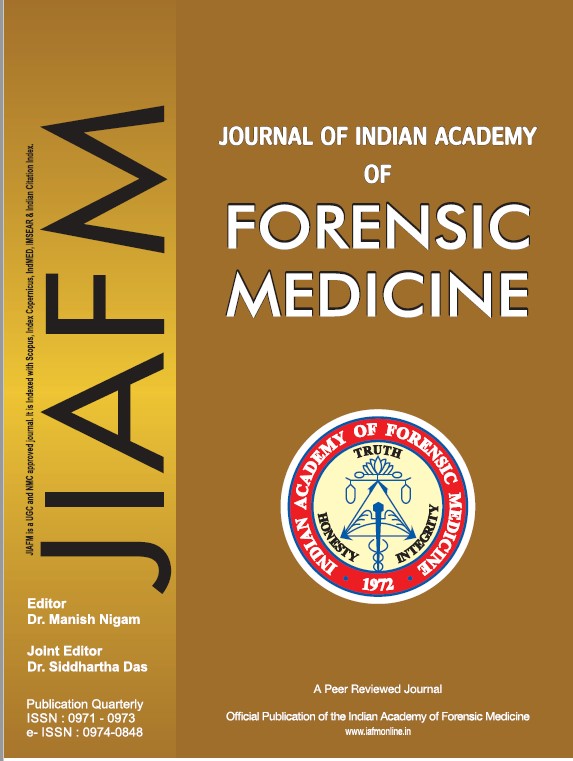Knowledge and Attitude of Medical Students and Interns toward Forensic Autopsy
DOI:
https://doi.org/10.48165/Keywords:
Autopsy, Forensic autopsy, Medical students, InternsAbstract
For centuries, autopsy has been instrumental in establishing the cause of death both in clinical and Forensic cases. Clinical autopsy has significant role in clinical quality control, clinical auditing and medical education. Medical student’s knowledge and attitude toward Forensic autopsies influence the quality of autopsy reports being prepared by them in their professional carriers. A survey was conducted on 100 medical students and 40 interns to assess their knowledge and attitude toward Forensic autopsy. Most of the medical students (76% Part I and 90% part II) and interns (60%) found that demonstrations of the autopsies during their 2nd Prof Practical classes was a learning experience and wished, they could see more autopsies. However in the present study, majority of the medical students (88% Final Yr. Part I and 84% Final Yr. Part II) and interns (87%) felt themselves incapable of performing autopsies independently on becoming physicians. Medical teachers should encourage the medical students to become more interested in observing Forensic autopsies. It is suggested that problem based learning during practical training of autopsy must be incorporated as a part of the medical curriculum.
Downloads
References
Brooks JP, Dempsey J. How can hospital autopsy rates be increased? Arch Pathol Lab Med 1991; 115:1107-11.
Cooper H, Lucas SB.The value of autopsy, believe it or not. The Lancet 2007; 370(9581):27.
Burton JL, Underwood J. Clinical, educational, and epidemiological value of autopsy. The Lancet 2007; 369:1471-80. 4. Hill RB, Anderson RE. The uses and value of autopsy in medical education as seen by pathology educators. Acad Med 1991; 66:97-100.
Benbow EW. The attitudes of second and third year medical students to the autopsy. A survey by postal questionnaire.ArchPathol Lab Med1991; 155:1171-6.
Burton JL. The autopsy in modern undergraduate medical education: a qualitative study of uses and curriculum considerations. Medical Education 2003; 37:1073-81.
Loughrey MB, Mc Cluggage WG, Toner PG. The declining autopsy rate and clinicians’ attitudes. Ulst Med J2000; 69:83-9. 8. Benbow EW. Medical student’s views on necropsies. J ClincPathol 1990; 43:969-76.
Nadesan K. The importance of the medico-legal autopsy. Malaysian J Pathol. 1997; 19(2): 105-9.
Yadwad BS. Medico-legal autopsy-what, why and how. J Indian Med Assoc. 2002; 100(12):703-5.
Badkur DS.Presidential Address: 32ndAnnual National Conference of Indian Academy of Forensic Medicine, Nellore, A.P. J Indian Acad Forensic Med. 2011; 33(1).
Charlton R. Autopsy and medical education. Rev J. R. Soc. Medicine. 1994; 87:232.
Marshall R, Catwright N, Mattick K. Teaching and learning pathology: a critical review of the English literature. Med. Educ. 2004; 38:302-13.
Rautji R, Kumar A, Behera C. Attitudes of Medcal Students towards Medicolegal / Clinical Autopsy. JIAFM;35(4):358-61. 15. Verma S.Teaching students the value of autopsies. Acad. Med. 1999; 74:855.
Jadeep C Jadav, Bhaskar N patel, Kaplesh A Shah, Rakesh N Tandon. Knowledge and attitude of medical students on Forensic autopsy in Ahmedabad city. JIAFM;35(1):26-28
Ekanem VJ and Akhgbe KO. Attitudes of medical students towards autopsy. Turk J Med Sci 2006; 36:51-56.


